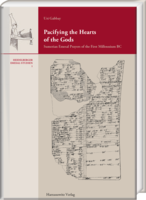|
|
more titles of the subject:
Download:
Please note: With adding digital Products to your cart
the payment will be handled via PayPal. The download will be provided after the payment is confirmed. Pacifying the Hearts of the Gods investigates the corpus of Emesal prayers, i.e., prayers composed in the Emesal register of the Sumerian language that are known from cuneiform tablets dating from the beginning of the second millennium BC up to the end of the first millennium BC. In the first millennium BC these prayers, which are usually accompanied by interlinear Akkadian translations, were divided into four main genres, natively called Balag, Eršema, Erša?uga, and Šuila. The content of the prayers is usually lamentful, mourning the destruction of various Mesopotamian cities and temples, but it is not restricted to the commemoration of past disasters.
The book examines the role of these prayers in the daily, monthly, annual, and noncalendrical cult of the temples of ancient Mesopotamia. It approaches these prayers, especially the Balag and Eršema genres, not only as texts but as part of a larger theological system that includes the ritual context of the prayers, their musical performance, and their cultic performer (the gala/kalû). Focusing on the first millennium BC, the book demonstrates how each element of this system serves the main theological purpose of the prayers: divine pacification. It also discusses the textual transmission of these prayers – most of which were included in the first-millennium BC series of kalûtu, “lore of the kalû cultic functionary” – on the basis of changes in the long litanies of gods, epithets, cities, and temples. Special emphasis is given to the scribal context of the prayers. |
|||||||||||||||||||||||||||||||||||||||||






